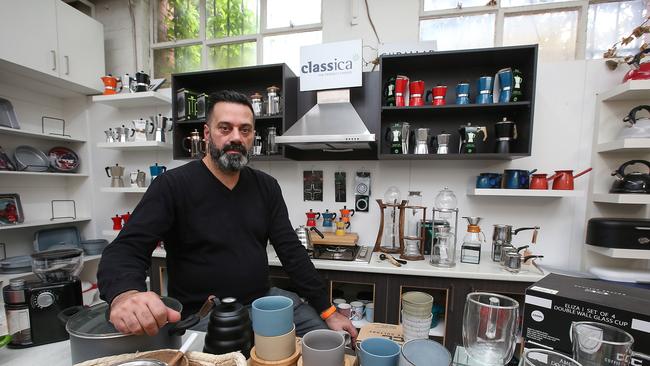Harris Scarfe supplier hits out after retail chain’s collapse
The collapse of retail chain Harris Scarfe left many suppliers out of pocket and angry, with one claiming he’s lost more than $1 mil while the administrator netted $70 mil during the restructuring process.

Business
Don't miss out on the headlines from Business. Followed categories will be added to My News.
An out-of-pocket supplier to Harris Scarfe has branded the administration process “legalised theft” after it paid out $70 million to the department store chain’s former private equity owner.
Classica Kitchen and Giftware managing director Robert Bekhazi said the collapse of Harris Scarfe would cost his Melbourne-based business more than $1 million.
Mr Bekhazi is among the many Harris Scarfe suppliers left both out of pocket and angry after Allegro Funds – the private equity firm which tipped Harris Scarfe into administration little more than a week after formally taking control – was paid out $70 million during its restructuring.
“It’s legalised theft, there is no other way to describe it,” Mr Bekhazi said of the administration process.
“All my hard work over the past 10 years has gone and it has gone with a government and a regulator not even seeming to notice.”
Allegro, an experienced buyer of distressed assets, tipped Harris Scarfe into voluntary administration on December 11, owing unsecured creditors such as suppliers and landlords between $146.1 million and $236.4 million.
Unsecured creditors last month signed off on a deal to sell the department store chain to Spotlight Group in a transaction which will net them as little as 1.3c on the dollar.
The maximum they can expect to receive is 20.5c.
Allegro emerged with a secured debt of $70 million when it bought Harris Scarfe from Greenlit Brands. That debt will be paid out in full.
The final creditors’ report which probes the transaction notes Allegro purchased Harris Scarfe for a “nominal sum”.
The hit to suppliers comes as the COVID-19 crisis plunges the nation into what many economists predict will be the sharpest annual downturn since the Great Depression.
Mr Bekhazi said while the final creditors’ report had made it clear that Allegro had not done anything illegal, the administration process was fundamentally flawed if it produced such outcomes.
“We need ASIC to look at this – the administration process should not be able to be used as a profit making exercise for some,” he said.
The nation’s insolvency rules were dramatically overhauled in 2017, allowing directors to trade while insolvent so long as they were working on a plan that may result in a better return to creditors than an immediate liquidation.
The final creditors’ report into Harris Scarfe concludes the department store chain became insolvent from the moment Allegro took control and a critical line of credit supplied by Greenlit Brands was severed.
Deloitte Restructuring Services partner Vaughan Strawbridge, who acted as the receiver representing Allegro during the administration process, said the private equity firm had taken over the secured debt as a normal part of the sale from Greenlit.
“It was not created, it was acquired via the acquisition,” he said.
Mr Strawbridge also said Allegro had tried to find a path to avoid putting the loss making Harris Scarfe into voluntary administration and noted the business had been bought as part of a wider deal to buy Best&Less and New Zealand’s Postie.
Allegro did not respond to questions from Business Daily.
MORE BUSINESS NEWS
HARRIS SCARFE INSOLVENT ‘FROM DAY ONE’
COULD THIS BE THE MOVE THAT SAVES TARGET?
